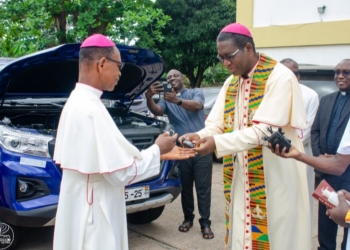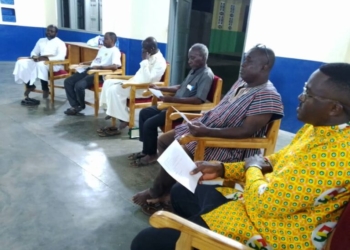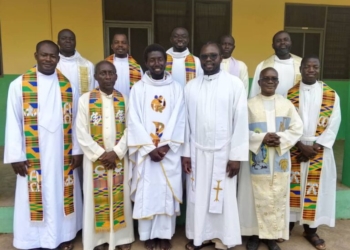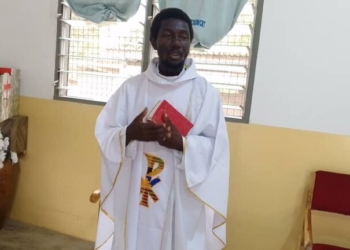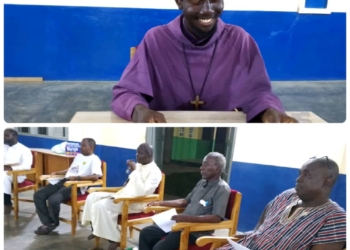He said this in a talk delivered during the June 28, 2025, programme with the Bishop and WASSCE candidates at the Sacred Heart and Divine Mercy Grotto, Bebusu, in the Kwahu Afram Plains South District.
Speaking on the topic: “Elements of Success at School and Beyond,” Fr. Formedza, who doubles as Youth Chaplain and Vocations Director for the Apostolic Vicariate of Donkorkrom, upheld that in order to become successful at school, the students must learn to prepare adequately to become critical thinkers who would put order in their lives.

“Put order in your lives or else, others would put disorder in your lives,” he stressed, maintaining that putting order in their lives calls for creativity, leaving of one’s comfort zone and adapting to the strict school rules and regulations.
And for them to be successful at school, they must be intentional, strategic, goal-oriented, impactful and result-driven, he added.
He listed some principles that could guide the WASSCE candidates as they prepare for the forthcoming exams. These included: Association, which is the ability to link new information to existing knowledge or experiences so that one automatically triggers the other, Assimilation, being the ability to integrate new knowledge into what the learner already knows thereby making learning meaningful, and Familiarization: Introducing new concepts or information by connecting them to something that is already known or familiar.
Other concepts that could be employed by the candidates, according to the Youth Chaplain were Repetition; the art of revisiting information or practicing a skill multiple times, which helps move things from short-term to long-term memory, Revision, which is the process of reviewing previously studied material to reinforce understanding and improve retention, and Retention, being the intentional decision to remember, which can be done with the usage of acronyms.

The Priest reflected further on becoming successful beyond school. Drawing inspiration from 1 Corinthians 13:11 which says “When I was a child, I spoke and acted like a child but now that I have grown up, I have given up childish behaviour and I speak and act like a grown up,” he upheld that to be successful beyond school does not follow logic and is subjective.
For him, there is a marked difference between growing old and growing up, indicating that growing old is biological, natural and involves natural processes with little or no effort on the part of man.
“Whether we like it or not, each passing day adds to our accumulated days on earth. It is mandatory and very much compulsory to grow old,” he reiterated.
Growing up, on the other hand, is a personal choice and decision. It is optional and entails strenuous effort on the part of man. It demands constant working at oneself to be better than he or she was a day gone by. It involves hard work so as to be successful.
“Success cannot be gotten on a silver platter, and there is no short cut to success,” he buttressed.
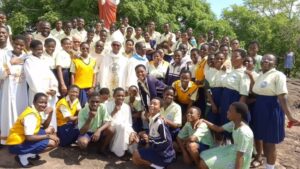
Alluding to what John Keats once said with regard to joy, that, “a thing of beauty, is joy forever,” the Vocations Director underscored that, true success beyond school should be reflective in the life of contentment, credibility and integrity, self-control, moving against the current and standards of this world, Commitment to true and time tested principles, Divine Connection and knowing the purpose of one’s existence.
He urged the students to work hard for their success, making reference to Mahatma Ghandi, who had maintained that “seeking wealth without work, knowledge without character, pleasure without conscience, politics without principles, commerce without morality, science without humanity and religion without sacrifice” are seven social ills that must be avoided.
“A successful man or woman beyond school is honest and sincere in little as well as big matters. A successful person is not the one who has not gotten the opportunity to either do right or otherwise, but the one who has the opportunity but still remains true to his or her well-formed conscience and chooses right over wrong in any given circumstance,” he expounded.
At the end of his presentation, the Priest posed this soul-searching question to the WASSCE candidates: “What would you do if copying at the exams was the only way to pass your exams?”

He extended profound gratitude to the Local Ordinary for initiating the maiden edition of the convocation of WASSCE Candidates of all second cycle schools within the Afram Plains, and the organisers; an occasion which he believed will enable the young minds to “cool off and be relaxed in anticipation for their examinations”.
Schools that participated at the programme were: St. Fidelis Senior High Technical School, Tease, St. Mary’s Vocational/Technical Senior High School, Adeemmra, and one representative from the Donkorkrom Agricultural Senior High School (DASHS).
The WASSCE candidates were accompanied by their School Chaplains, who had organised the event, and members of their respective school choirs, who helped enhance the liturgy of the day. Some staff from the participating schools were also present.

Present at the day’s event were: the Most Rev. John Alphonse Asiedu, SVD, Bishop of Donkorkrom Apostolic Vicariate, Rev. Fr. Leopold, Ettuh, Chancellor of the Vicariate and Chaplain of St. Mary’s Vocational/Technical Senior High School, Adeemmra, Rev. Fr. Michael Awuah Ansah, Chaplain of St. Fidelis Senior High Technical School, Tease, Rev Fr. Akrereke Coleman Getor, Parish Priest of St. Theresa of the Child Jesus Parish, Samanhyia and Rev. Fr. Gabriel Eddo Gyamfi, Assisting Priest at St. Fidelis Parish, Tease.
Other activities featured during the day’s programme included Holy Mass for the Feast of the Immaculate Conception, officiated by the Chief Shepherd, Rosary Procession from the Bebusu Church to the Grotto, Confessions, blessing of the WASSCE candidates along with their writing materials, among others.
By Sr. Sylvie Lum Cho, MSHR (DEPSOCOM, Donkorkrom Apostolic Vicariate)



